实验五
实验任务一
源码程序
#include <stdio.h> #define N 4 int main() { int x[N] = {1, 9, 8, 4}; int i; int *p; // 方式1:通过数组名和下标遍历输出数组元素 for (i = 0; i < N; ++i) printf("%d", x[i]); printf("\n"); // 方式2:通过指针变量遍历输出数组元素 (写法1) for (p = x; p < x + N; ++p) printf("%d", *p); printf("\n"); // 方式2:通过指针变量遍历输出数组元素(写法2) p = x; for (i = 0; i < N; ++i) printf("%d", *(p + i)); printf("\n"); // 方式2:通过指针变量遍历输出数组元素(写法3) p = x; for (i = 0; i < N; ++i) printf("%d", p[i]); printf("\n"); return 0; }
运行结果

实验任务1.2
源码程序
#include <stdio.h> int main() { int x[2][4] = {{1, 9, 8, 4}, {2, 0, 4, 9}}; int i, j; int *p; // 指针变量,存放int类型数据的地址 int(*q)[4]; // 指针变量,指向包含4个int型元素的一维数组 // 使用数组名、下标访问二维数组元素 for (i = 0; i < 2; ++i) { for (j = 0; j < 4; ++j) printf("%d", x[i][j]); printf("\n"); } // 使用指针变量p间接访问二维数组元素 for (p = &x[0][0], i = 0; p < &x[0][0] + 8; ++p, ++i) { printf("%d", *p); if ((i + 1) % 4 == 0) printf("\n"); } // 使用指针变量q间接访问二维数组元素 for (q = x; q < x + 2; ++q) { for (j = 0; j < 4; ++j) printf("%d", *(*q + j)); printf("\n"); } return 0; }
运行结果
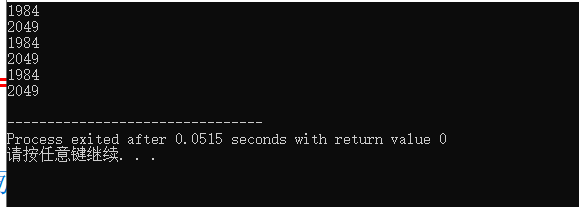
试验任务二
原码程序
#include <stdio.h> #include <string.h> #define N 80 int main() { char s1[] = "Learning makes me happy"; char s2[] = "Learning makes me sleepy"; char tmp[N]; printf("sizeof(s1) vs. strlen(s1): \n"); printf("sizeof(s1) = %d\n", sizeof(s1)); printf("strlen(s1) = %d\n", strlen(s1)); printf("\nbefore swap: \n"); printf("s1: %s\n", s1); printf("s2: %s\n", s2); printf("\nswapping...\n"); strcpy(tmp, s1); strcpy(s1, s2); strcpy(s2, tmp); printf("\nafter swap: \n"); printf("s1: %s\n", s1); printf("s2: %s\n", s2); return 0; }
运行结果
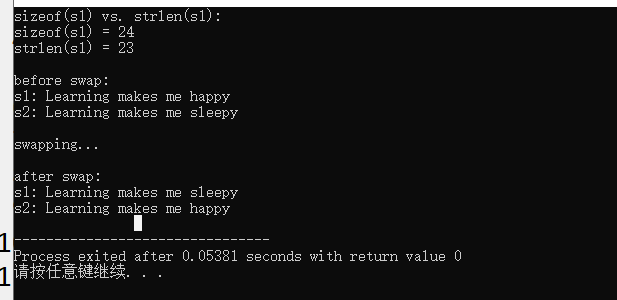
讨论结果:
数组s1的大小为24;sizeof(s1)计算的是为数组分配的空间大小;strlen(s1)计算的是字符串的长度;
不能,s1代表数组名,指的是数组开始的地址
实验任务2.2
源码程序
#include <stdio.h> #include <string.h> #define N 80 int main() { char *s1 = "Learning makes me happy"; char *s2 = "Learning makes me sleepy"; char *tmp; printf("sizeof(s1) vs. strlen(s1): \n"); printf("sizeof(s1) = %d\n", sizeof(s1)); printf("strlen(s1) = %d\n", strlen(s1)); printf("\nbefore swap: \n"); printf("s1: %s\n", s1); printf("s2: %s\n", s2); printf("\nswapping...\n"); tmp = s1; s1 = s2; s2 = tmp; printf("\nafter swap: \n"); printf("s1: %s\n", s1); printf("s2: %s\n", s2); return 0; }
运行结果
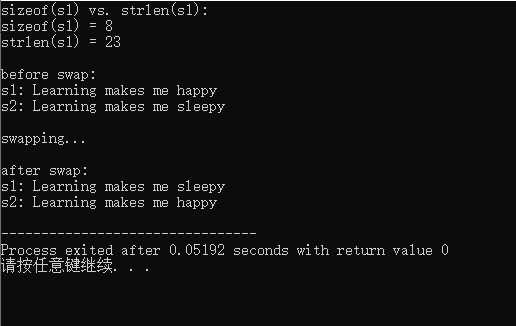
讨论结果
s1 中存放的是地址,sizeof(s1)计算的是系统为其分配的存储空间,strlen(s1)计算的是字符的长度
可以。此题是定义了一个指针数组,然后由指针数组指向一个字符串
交换的是指针对应的地址,没有交换
试验任务三
源码程序
#include <stdio.h> void str_cpy(char *target, const char *source); void str_cat(char *str1, char *str2); int main() { char s1[80], s2[20] = "1984"; str_cpy(s1, s2); puts(s1); str_cat(s1, " Animal Farm"); puts(s1); return 0; } void str_cpy(char *target, const char *source) { while (*target++ = *source++) ; } void str_cat(char *str1, char *str2) { while (*str1) str1++; while (*str1++ = *str2++) ; }
运行结果

试验任务四
源码程序
#include<stdio.h> #define N 80 //后面没有分号 int func(char*);//定义一个函数,变量为char类型指针;此处括号内只需要标明函数的变量类型;注意此处定义函数需要分号 //进行主函数的编写:讲字符串输进数组,通过func函数,判断其是否属于回文串 int main() { char str[80];//定义一个80容量的字符型数组 while(gets(str)!=NULL) { if(func(str))//是回文串返回1,否则返回0 printf("yes\n"); else printf("no\n"); } return 0; } int func(char *str)//此处括号里需要标明函数的变量类型及变量名称; { char *begin, *end; begin=end=str; while(*end) end--; end++; while(begin<end) { if(begin!=end) return 0; else { begin++; end--; } } }
运行结果
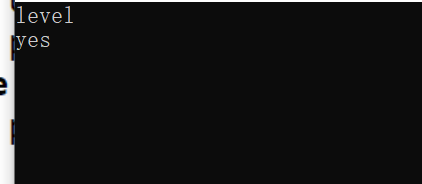
实验任务五
源码程序
#include<stdio.h> #define N 80 void func(char *);//定义以指针为变量的函数; int main() { char s[N]; while(scanf("%s",s)!=EOF)//通过多组输入,对数组进行赋值; { func(s);//对数组进行删去中间星号的操作; puts(s);//输出处理后的数组 } return 0; } void func(char *str) { int i; char *p1,*p2,*p;//定义指针 p1=str; while(*p1=='*') p1++;//将指针p1移动到第一个字母处; p2=str; while(*p2) p2++; p2--;//将p2移动到最后一个 * 处; while(*p2=='*') p2--; //将p2最终定位到最后一个字母处 p=str;//p是一个一直移动的指针 i=0; while(p<p1) { str[i]=*p; p++; i++; } while(p<=p2) { if(*p!='*') { str[i]=*p; i++; } p++; } while(*p!='\0') { str[i]=*p; p++; i++; } str[i]='\0'; //由于在上一步 判断到*p=='\0'时,已经执行了i++操作,所以直接将str[i]='\0'即可; }
运行结果

实验六
源码程序
#include<stdio.h> #include<string.h> void sort(char*name[],int n); int main() { char*course[4]={"C program", "C++ object oriented program", "Operating System", "Date Structure and Algorithms"}; int i; sort(course,4); for(i=0;i<4;i++) printf("%s\n",course[i]); return 0; } void sort(char*name[],int n) { int i,j; char*temp; for(i=0;i<n-1;i++) for(j=0;j<n-1-i;j++) if(strcmp(name[j],name[j+1])>0) { temp=name[j]; name[j]=name[j+1]; name[j+1]=temp; } }
运行结果

实验6.2
源码程序
#include<stdio.h>
#include<string.h>
void sort(char*name[],int n);
int main()
{
char*course[4]={"C program",
"C++ object oriented program",
"Operating System",
"Date Structure and Algorithms"};
int i;
sort(course,4);
for(i=0;i<4;i++)
printf("%s\n",course[i]);
return 0;
}
void sort(char*name[],int n)
{
int i,j,k;
char*tmp;
//选择排序的写法
for(i=0;i<n-1;i++)//逐个选取从一到最后的位子,最后一个位置上有数会自动归位
{
k=i;//只能常数赋值给变量
for(j=i+1;j<n;j++)//从选取的这个数与他后面的数比较,如果打就往后排,一次比到最后一个数
if(strcmp(name[j],name[k])<0)
k=j;
//k取了一个标志作用 ,同时它为中间变量,实现了未改变内存中字符的存储位置的操作
if(k!=i)
{
tmp=name[i];
name[i]=name[k];
name[k]=tmp;
}
}
}
运行结果
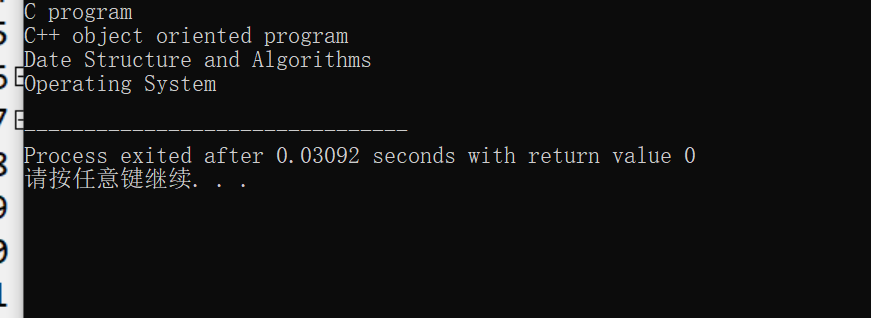
问题讨论:未改变字符串的存储位置
试验七
源码程序
#include<stdio.h> #include<string.h> #define N 5 int check_id(char*str); int main() { char *pid[N]={"31010120000721656X", "330106199609203301", "53010220051126571", "510104199211197977", "53010220051126133Y"}; int i; for(i=0;i<N;i++) if(check_id(pid[i])) printf("%s\tTure\n",pid[i]); else printf("%s\tFalse\n",pid[i]); return 0; } int check_id(char*str) { if(strlen(str)!=18) return 0; else { char *p; p=str;//定义一个指针指到最头上 while(*p>='0'&&*p<='9'&&*p!='\0'||*p=='X') p++; if(*p=='\0') return 1; else return 0; } }
运行结果

实验八
源码程序
#include <stdio.h> #define N 80 void encoder(char* s); // 函数声明 void decoder(char* s); // 函数声明 int main() { char words[N]; printf("输入英文文本: "); while (gets(words) != " ") { printf("编码后的英文文本: "); encoder(words); // 函数调用 printf("%s\n", words); printf("对编码后的英文文本解码: "); decoder(words); // 函数调用 printf("%s\n", words); printf("\n"); } return 0; } /*函数定义 功能:对s指向的字符串进行编码处理 编码规则: 对于a~z或A~Z之间的字母字符,用其后的字符替换; 其中,z用a替换,Z用A替换 其它非字母字符,保持不变 */ void encoder(char* s) { int i; for (i = 0; s[i] != '\0'; i++) { if (s[i] < 'A' || s[i]>'Z' && s[i] < 'a' || s[i]>'z') s[i] = s[i]; else if (s[i] != 'Z' && s[i] != 'z') s[i] = s[i] + 1; else if (s[i] == 'z') s[i] = 'a'; else s[i] = 'A'; } } /*函数定义 功能:对s指向的字符串进行解码处理 解码规则: 对于a~z或A~Z之间的字母字符,用其前面的字符替换; 其中,a用z替换,A用Z替换 其它非字母字符,保持不变 */ void decoder(char* s) { int i; for (i = 0; s[i] != '\0'; i++) { if (s[i] < 'A' || s[i]>'Z' && s[i] < 'a' || s[i]>'z') s[i] = s[i]; else if (s[i] != 'A' && s[i] != 'a') s[i] = s[i] - 1; else if (s[i] == 'A') s[i] = 'Z'; else s[i] = 'z'; } }
运行结果
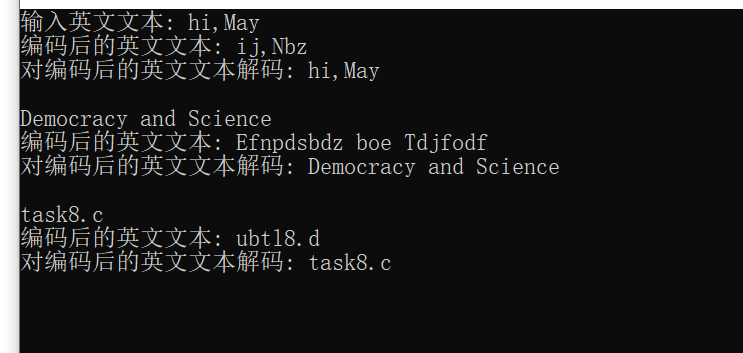



 浙公网安备 33010602011771号
浙公网安备 33010602011771号